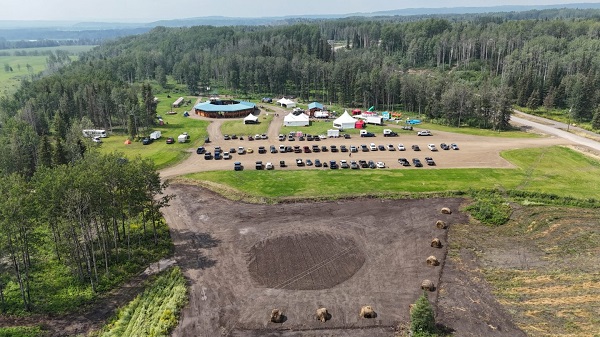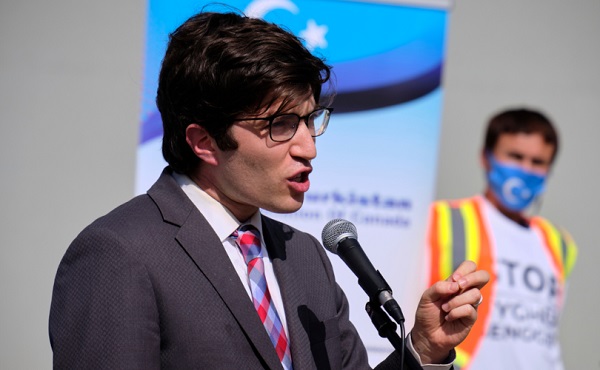Alberta
Halfway River First Nation makes history with Montney natural gas development deal

In northeast B.C., about 75 kilometres from Fort St. John, Halfway River First Nation sits in the heart of the Montney, one of North America’s largest natural gas plays. Photo courtesy Halfway River First Nation
From the Canadian Energy Centre
By Will Gibson
Greg Kist has seen plenty of change during more than three decades working in the energy industry. But the former executive with Petronas and Progress Energy has rarely experienced a history-making moment.
That happened in July 2024, when the B.C. government awarded the Halfway River First Nation what’s known as oil and gas tenure in the heart of the Montney play.
It’s an agreement that grants the Nation decision-making authority over the exploration and development of petroleum and natural gas resources on more than 34,000 hectares of Crown land in its traditional territory, located approximately 1,000 kilometres northeast of downtown Vancouver.
That agreement is now moving further into action with a deal between Halfway River-owned Tsaa Dunne Za Energy (TDZE) and ARC Resources.

Members of the Halfway River First Nation participate in a field tour with the BC Energy Regulator in June 2025. Photo courtesy BCER
The agreement, signed earlier this year, will see TDZE work with Calgary-based ARC to develop about 25 per cent of the tenured land.
The region is adjacent to ARC’s existing Attachie natural gas operations, which are rich in high-value natural gas liquids.
The company describes Attachie as one of its most profitable assets, which can be expanded thanks to the TDZE agreement.
“This land was deferred from development for more than two decades while sitting in the premier natural gas play in North America,” says Kist, one of TDZE’s managing executives.
“Unlocking it will generate all kinds of economic activity and royalties for the B.C. government that help pay for schools and health care. But it will also generate the same benefits for the Halfway River First Nation.”
ARC plans to integrate the new areas using existing roads, pipelines and other infrastructure from Attachie.
Developing the land will still require consultation with the Halfway River First Nation.

Drilling in the Montney play straddles the border between northeast B.C. and northwest Alberta. Photo courtesy ARC Resources
“This is very much about Tsaa Dunne Za Energy delivering the best return on this particular asset for its shareholders, which are the members of the Halfway River First Nation,” Kist says.
In addition to granting tenure to develop oil and gas on the land, the B.C. government and Halfway River have implemented a landscape planning pilot to mitigate the impacts of development on the Nation’s Treaty 8 rights and manage potential cumulative effects of new development.
“The tenure award and landscape planning pilot will help to ensure that oil and gas development in these areas is sustainable and managed in accordance with the values of the Halfway River First Nation,” Chief Darlene Hunter said in a statement.
Kist sees the agreement as a template for other governments, energy companies and First Nations to follow.
“This has the potential to be the model for cooperative development so that we can develop resources in the right way that benefits governments, First Nations and industry. I’m proud to be a part of this because everybody involved wins from this.”
Alberta
Alberta bill would protect freedom of expression for doctors, nurses, other professionals

From LifeSiteNews
‘Peterson’s law,’ named for Canadian psychologist Jordan Peterson, was introduced by Alberta Premier Danielle Smith.
Alberta’s Conservative government introduced a new law that will set “clear expectations” for professional regulatory bodies to respect freedom of speech on social media and online for doctors, nurses, engineers, and other professionals.
The new law, named “Peterson’s law” after Canadian psychologist Jordan Peterson, who was canceled by his regulatory body, was introduced Thursday by Alberta Premier Danielle Smith.
“Professionals should never fear losing their license or career because of a social media post, an interview, or a personal opinion expressed on their own time,” Smith said in a press release sent to media and LifeSiteNews.
“Alberta’s government is restoring fairness and neutrality so regulators focus on competence and ethics, not policing beliefs. Every Albertan has the right to speak freely without ideological enforcement or intimidation, and this legislation makes that protection real.”
The law, known as Bill 13, the Regulated Professions Neutrality Act, will “set clear expectations for professional regulatory bodies to ensure professionals’ right to free expression is protected.”
According to the government, the new law will “Limit professional regulatory bodies from disciplining professionals for expressive off-duty conduct, except in specific circumstances such as threats of physical violence or a criminal conviction.”
It will also restrict mandatory training “unrelated to competence or ethics, such as diversity, equity, and inclusion training.”
Bill 13, once it becomes law, which is all but guaranteed as Smith’s United Conservative Party (UCP) holds a majority, will also “create principles of neutrality that prohibit professional regulatory bodies from assigning value, blame or different treatment to individuals based on personally held views or political beliefs.”
As reported by LifeSiteNews, Peterson has been embattled with the College of Psychologists of Ontario (CPO) after it mandated he undergo social media “training” to keep his license following posts he made on X, formerly Twitter, criticizing Trudeau and LGBT activists.
He recently noted how the CPO offered him a deal to “be bought,” in which the legal fees owed to them after losing his court challenge could be waived but only if he agreed to quit his job as a psychologist.
Early this year, LifeSiteNews reported that the CPO had selected Peterson’s “re-education coach” for having publicly opposed the LGBT agenda.
The Alberta government directly referenced Peterson’s (who is from Alberta originally) plight with the CPO, noting “the disciplinary proceedings against Dr. Jordan Peterson by the College of Psychologists of Ontario, demonstrate how regulatory bodies can extend their reach into personal expression rather than professional competence.”
“Similar cases involving nurses, engineers and other professionals revealed a growing pattern: individuals facing investigations, penalties or compulsory ideological training for off-duty expressive conduct. These incidents became a catalyst, confirming the need for clear legislative boundaries that protect free expression while preserving professional standards.”
Alberta Minister of Justice and Attorney General Mickey Amery said regarding Bill 13 that the new law makes that protection of professionals “real and holds professional regulatory bodies to a clear standard.”
Last year, Peterson formally announced his departure from Canada in favor of moving to the United States, saying his birth nation has become a “totalitarian hell hole.”
Alberta
‘Weird and wonderful’ wells are boosting oil production in Alberta and Saskatchewan

From the Canadian Energy Centre
Multilateral designs lift more energy with a smaller environmental footprint
A “weird and wonderful” drilling innovation in Alberta is helping producers tap more oil and gas at lower cost and with less environmental impact.
With names like fishbone, fan, comb-over and stingray, “multilateral” wells turn a single wellbore from the surface into multiple horizontal legs underground.
“They do look spectacular, and they are making quite a bit of money for small companies, so there’s a lot of interest from investors,” said Calin Dragoie, vice-president of geoscience with Calgary-based Chinook Consulting Services.
Dragoie, who has extensively studied the use of multilateral wells, said the technology takes horizontal drilling — which itself revolutionized oil and gas production — to the next level.
“It’s something that was not invented in Canada, but was perfected here. And it’s something that I think in the next few years will be exported as a technology to other parts of the world,” he said.
Dragoie’s research found that in 2015 less than 10 per cent of metres drilled in Western Canada came from multilateral wells. By last year, that share had climbed to nearly 60 per cent.
Royalty incentives in Alberta have accelerated the trend, and Saskatchewan has introduced similar policy.
Multilaterals first emerged alongside horizontal drilling in the late 1990s and early 2000s, Dragoie said. But today’s multilaterals are longer, more complex and more productive.
The main play is in Alberta’s Marten Hills region, where producers are using multilaterals to produce shallow heavy oil.
Today’s average multilateral has about 7.5 horizontal legs from a single surface location, up from four or six just a few years ago, Dragoie said.
One record-setting well in Alberta drilled by Tamarack Valley Energy in 2023 features 11 legs stretching two miles each, for a total subsurface reach of 33 kilometres — the longest well in Canada.
By accessing large volumes of oil and gas from a single surface pad, multilaterals reduce land impact by a factor of five to ten compared to conventional wells, he said.
The designs save money by skipping casing strings and cement in each leg, and production is amplified as a result of increased reservoir contact.
Here are examples of multilateral well design. Images courtesy Chinook Consulting Services.
Parallel
Fishbone
Fan
Waffle
Stingray
Frankenwells
-

 Energy1 day ago
Energy1 day agoExpanding Canadian energy production could help lower global emissions
-

 Business1 day ago
Business1 day agoWill the Port of Churchill ever cease to be a dream?
-

 Great Reset2 days ago
Great Reset2 days agoEXCLUSIVE: The Nova Scotia RCMP Veterans’ Association IS TARGETING VETERANS with Euthanasia
-

 Daily Caller2 days ago
Daily Caller2 days agoSpreading Sedition? Media Defends Democrats Calling On Soldiers And Officers To Defy Chain Of Command
-

 Health2 days ago
Health2 days agoDisabled Canadians petition Parliament to reverse MAiD for non-terminal conditions
-

 Business1 day ago
Business1 day agoThe numbers Canada uses to set policy don’t add up
-

 COVID-1914 hours ago
COVID-1914 hours agoFreedom Convoy protestor Evan Blackman convicted at retrial even after original trial judge deemed him a “peacemaker”
-

 Business1 day ago
Business1 day agoNew airline compensation rules could threaten regional travel and push up ticket prices











